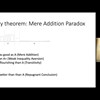welfarist

Krister Bykvist: Who should care about impossibility theorems in population ethics?
Research seminar with Krister Bykvist, Professor in Practical Philosophy at the Department of Philosophy, Stockholm University and Institute for Futures Studies. This seminar was arranged by the Insti
Harm and Discrimination
Ethical Theory and Moral Practice, 22, 873–891. doi:10.1007/s10677-018-9908-4 Abstract Many legal, social, and medical theorists and practitioners, as well as lay people, seem to be concerned with the h
Klemens Kappel: The Epistemic Significance of Convergence in Ethical Theory
Venue: Institutet för framtidsstudier, Holländargatan 13, 4th floor, StockholmResearch seminar with Klemens Kappel, Professor at the Department of Communication, University of Copenhagen.Join us on sit
The Repugnant Conclusion: An Overview
In Stephen M. Gardiner (red), The Oxford Handbook of Intergenerational Justice, Oxford Academic. Abstract The repugnant conclusion can be formulated as follows: For any population consisting of people wi
Democracy and the Common Good: A Study of the Weighted Majority Rule
Doctoral thesis in practical philosophy, Stockholm: Department of Philosophy, Stockholm University. Abstract In this study I analyse the performance of a democratic decision-making rule: the weighted ma
Research seminar with Krister Bykvist: Who should care about impossibility theorems in population ethics?
Online seminar. Register here > Research seminar with Krister Bykvist, Professor in Practical Philosophy at the Department of Philosophy, Stockholm University and Institute for Futures Studies. This se, New Jersey, USA.
Completed: Valuing future lives
How should we value future lives when making decisions? This question is directly relevant to for example prioritisation in health care, population control, climate change, and existential risk (the survival of animal species and humanity).
Gustaf Arrhenius more information
Current and Recent Projects The Mimir Institute for Long Term Futures Studies Climate Ethics and Future Generations Sustainable Population in the Time of Climate Change Anxieties of Democracy The Boundary








